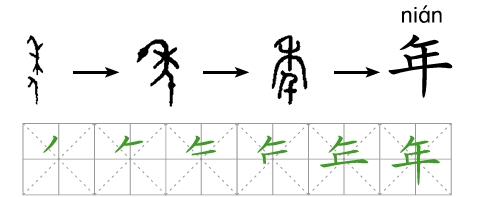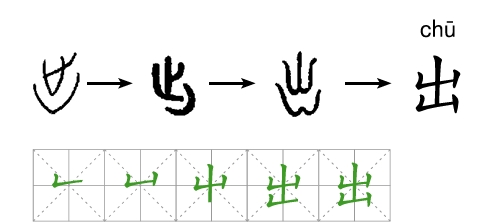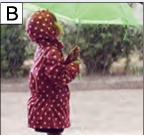语文练习
热身 Warm-up
1 给下面的词语选择对应的图片
Match the pictures with the words/phrases.
yú 鱼 ________
kāfēi 咖啡 ________
kǎo shì 考试 ________
yīfu 衣服 ________
dǎ qiú 打球 ________
xiūxi 休息 ________
2 看下面的图片,说说他们在什么地方做什么
Look at the pictures and describe what they are doing and where they are doing it.
zài (fànguǎn) chī fàn 在(饭馆)吃饭
zài (kāfēiguǎn) hē kāfēi 在(咖啡馆)喝咖啡
zài (xuéxiào) kǎo shì 在(学校)考试
zài (shāngdiàn) mǎi yīfu 在(商店)买衣服
课文内容
课文 Text
1 在家里 At home 05 – 1
Wǎnshang wǒmen qù fànguǎn chī fàn, zěnyàng?
A: 晚上 我们去饭馆吃饭,怎么样?
Wǒ bù xiǎng qù wàimiàn chī, wǒ xiǎng zài jiā chī.
B: 我不想去外面吃,我想在家吃。
Nà nǐ zhǔnbèi zuò shénme ne?
A: 那你准备做什么呢?
Jiù zuò nǐ ài chī de yú ba.
B: 就做你爱吃的鱼吧。

English Version
A: Let’s go to a restaurant for dinner. What do you think?
B: I don’t want to eat out. I want to eat at home.
A: What are you planning to cook?
B: I’m thinking of fish, your favorite.
New Words
1. 外面 wàimiàn n. outside
2. 准备 zhǔnbèi v. to intend, to plan
3. 就 jiù adv. used to indicate a conclu – sion or resolution
4. 鱼 yú n. fish
5. 吧 ba part. used at the end of a sentence to indicate consultation, suggestion, request or command
2 在商店 In a store 05 – 2

Bāng wǒ kàn yíxià zhè jiàn yīfu zěnyàng.
A: 帮我看一下这件衣服怎么样。
Yánsè hái kěyǐ, jiùshì yǒudiǎnr dà.
B: 颜色还可以,就是有点儿大。
Zhè jiàn xiǎo de zěnyàng?
A: 这件小的怎么样?
Zhè jiàn bùcuò, jiù mǎi zhè jiàn ba.
B: 这件不错,就买这件吧。
English Version
A: What do you think of this garment?
B: The color is OK, but it seems too large.
A: What about this small one?
B: This one is good. Take this one.
New Words
6. 件 jiàn m. (used for clothes among other items) piece
7. 还 hái adv. passably, fairly, rather
8. 可以 kěyǐ adj. not bad
9. 不错 bùcuò adj. pretty good
Content
3 在教室 In the classroom 05-3
Jīntiān qù bu qù dǎ qiú?
A: 今天 去不去打球?
Zhè liǎng tiān yǒudiǎnr lèi, bú qù dǎ qiú le.
B: 这 两天有点儿累,不去打球了。
Nǐ zài zuò shénme ne? Shì zài xiǎng zuótiān de kǎoshì ma?
A: 你在做 什么呢? 是在 想 昨天的 考试吗?
Shì a, wǒ juéde tīng hé shuō hái kěyǐ, dú hé xiě bù hǎo, hěn duō zì wǒ dōu bù zhīdào shì shénme yìsi.
B: 是啊,我觉得听和说 还可以,读和写不好,很 多字 我都不知道是 什么意思。
English Version
A: Will you go to play the ball today?
B: No, I won’t. I’ve been feeling tired lately.
A: What are you doing? Are you thinking about yesterday’s test?
B: Yes. I think I did OK in listening and speaking, but not in reading and writing, I didn’t know the meanings of many characters.
New Words
10. 考试 kǎoshì n. test, exam
11. 意思 yìsi n. meaning

4 在公司 In the company 05-4
Xiūxi yíxià ba, hē kāfēi ma?
A: 休息一下吧,喝咖啡吗?
Bù hē le, wǒ yǐjīng hē liǎng bēi le.
B: 不喝了,我已经喝 两杯了。
Shì a, kāfēi hē duō le duì shēntǐ bù hǎo.
A: 是啊,咖啡喝多了 对身体不好。
Yǐhòu wǒ shǎo hē yìdiǎnr, měi tiān hē yì bēi.
B: 以后我 少喝一点儿,每天 喝一杯。
English Version
A: Let’s take a rest. Would you like some coffee?
B: No, thanks. I’ve already had two cups.
A: Right. Too much coffee is bad for our health.
B: I’ll drink less coffee. One cup a day.
New Words
12. 咖啡 kāfēi n. coffee
13. 对 duì prep. (used before a noun or pronoun) to, for
14. 以后 yǐhòu n. after, afterwards, later

Notes
注释 Notes
1 副词 “就” The Adverb “就”
“就 + 动词” 表示承接上文,得出结论。例如:
The structure “就 + verb” indicates a conclusion or a resolution made on the basis of what’s been mentioned previously. For example:
- 你不想去,就在家休息吧。
- 这儿的咖啡不错,就喝咖啡吧。
- 就做你爱吃的鱼吧。
• 注 意: 在 “颜色还可以,就是有点儿大” 这句话中,“就是” 表示让步。
• Attention: In the sentence “颜色还可以,就是有点儿大”, “就是” indicates concession.
2 语气副词 “还”(1) The Modal Adverb “还”(1)
“还 + 形容词” 表示勉强过得去。例如:
The structure “还 + Adj” means that something is passable or acceptable. For example:
- A: 你身体怎么样?
B: 还好。
- A: 这件衣服大吗?
B: 还行,不太大。
- A: 昨天的考试怎么样?
B: 我觉得听和说还可以,读和写不好。
3 程度副词 “有点儿” The Adverbial Modifier “有点儿”
“有点儿 + 形容词/动词”,一般表示说话人消极、不满的情绪。例如:
The structure “有点儿 + adjective/verb” indicates the speaker’s negative mood or complaint. For example:
- 今天天气有点儿冷。
- 我昨天有点儿累。
- (这件衣服) 有点儿大。




































 –>
–>





 拼音 Pinyin
拼音 Pinyin


























